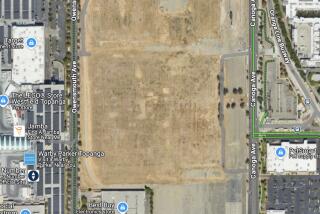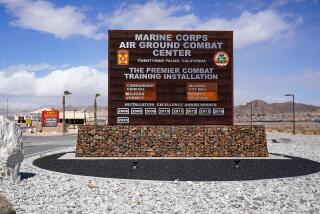Navy: Health survey rules out need for Guant�namo ‘cancer cluster’ probe
- Share via
U.S. military health specialists have taken air samples at the Pentagon’s war court compound at Guantanamo Bay, Cuba, and examined the files of seven people who got cancer and worked there and ruled out the need for a full-blown cancer cluster investigation, the Navy said in a statement Thursday.
The U.S. Navy base issued the statement in response to a July 14 complaint to the Pentagon Inspector General that cited seven instances of civilians and service members who contracted a variety of cancers and had spent time at the compound, Camp Justice. One of them, Lt. Cmdr. William Kuebler, a military defense attorney, had cancer of the appendix and died days after the complaint was filed.
But the Navy base commander, Capt. David Culpepper, said in the statement Thursday that a combined Navy and Marine Corps health team using criteria established by the Centers for Disease Control and Prevention carried out air sampling of the compound’s offices, buildings, tents and the trailer park and concluded they were “habitable for occupancy.”
Base officials had earlier acknowledged that the compound has asbestos, a carcinogen. But between the testing and a study of incomplete documentation, Culpepper said, “found no record of contamination.”
Base officials were unable to say Thursday whether soil and water samples were also taken at the site.
Nor did they respond to a question of whether the survey found fuel farms and ordnance, unexploded or otherwise, at Camp Justice site of a $12 million maximum-security court, trailer park known as “the Cuzcos,” offices and tent city built atop the obsolete McCalla air field. In the 1990s it was used as a migrant camp for Cuban families picked up at sea during the so-called rafter crisis. Lawyers and civilians who regularly work at the compound have been anxious about reports of ill colleagues.
In August, the military announced that an industrial hygiene team including epidemiologists, occupational and environmental physicians and human health risk assessors was conducting the study.
“The team did find that data gaps exist in available historical documentation,” Culpepper said in the statement. To fill the gaps, some contractors would likely visit the base later this month “to finalize the environmental sampling.”
“A formal cancer cluster investigation is not supported,” the statement said, “because the number and various types of cancer cases validated in the review do not meet the criteria established by the Centers for Disease Control and Prevention.”
The base spokeswoman, Kelly Wirfel, said the team reviewed the records of the seven individuals who were part of the original complaint but could not on Thursday provide a list of the various types of cancer the study turned up.
The war compound is on one end of the base, far from the Detention Center Zone of 116 captives staffed by 2,000 or more troops and civilians. It is also far from the suburban-style housing where most of the 6,000 base residents live.
(c)2015 Miami Herald
Visit Miami Herald at www.miamiherald.com
Distributed by Tribune Content Agency, LLC.
More to Read
Sign up for Essential California
The most important California stories and recommendations in your inbox every morning.
You may occasionally receive promotional content from the Los Angeles Times.












